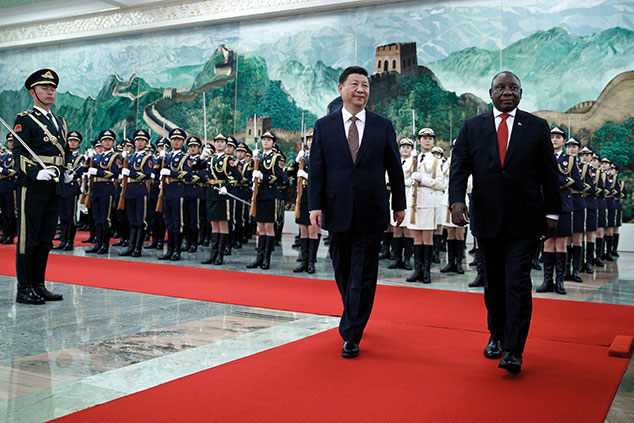
Prime Minister Theresa May’s trip to South Africa, Nigeria and Kenya “was long overdue”, says the Financial Times. The last time a British prime minister visited Africa was in 2013, when David Cameron attended Nelson Mandela’s memorial service. “For a nation supposedly intent on reinventing itself outside the EU as a global player that record looks decidedly weak.”
Although state visits do not “necessarily reflect strategic priorities”, Africans will be in no doubt as to Chinese, Turkish, or French intentions. It is two decades since Beijing started prioritising African relations and China’s top leaders made 79 visits to African countries between 2007 and 2017. France’s Emmanuel Macron has visited 13 African countries in 15 months. Turkey’s president has visited 23.
Lagging behind
Britain is indeed late to the party, says The Economist. This is reflected in its number of diplomatic missions. Britain has 31 embassies; the US 49, China 46. France has 42 in sub-Saharan Africa alone. Britain has also “churned through” six Africa ministers since 2012. “All this adds up”: Africa’s trade with Britain “is worth $36bn, a fifth of the value of its trade with China and a tenth that of its trade with the EU”.
In spite of this, Britain still “carries heft” in terms of aid, nearly topping the list of donors and direct investment, where it comes second only to the US. May has promised a further $5.2bn, most of which will be channelled through CDC (formerly known as the Commonwealth Development Corporation), the government’s overseas investment arm, signalling a shift in priorities.
More needs to be done – such as improving the visa system for Africans visiting the UK – but to say Britain has done little recently to engage with Africa is unfair, says Alex Vines in The Daily Telegraph. The former foreign secretary, Boris Johnson, visited Africa more than any senior UK government official in many years, and despite “policy bandwidth in London” being overwhelmed by Brexit, the UK’s National Security Council approved a new government Africa strategy earlier this year. Embassies in Africa are being reopened or set up.
From Johannesburg to Beijing
Yet if you think that matters, just look to Beijing this week, says The Times. When President Xi Jinping unveiled his first $60bn package of loans for Africa, he travelled to Johannesburg to make the announcement. “For his second, three years later, Africa has come to him.” While the British prime minister was on her tour, heads of state and other senior figures from 54 African countries were heading to the Chinese capital “for a summit that demonstrates with sobering clarity how foreign influence over the world’s fastest-growing continent is shifting”.
Since 2000, China’s trade with Africa has grown 20-fold to $220bn, dwarfing Britain and other big European economies. It is investing heavily in infrastructure: a $4bn railway line in Kenya and Africa’s largest hydroelectric dam in Ethiopia are just two examples. The effect of this – and the “courtship” from Brazil, India, Russia, Turkey and others – has been to “shake up an old and fraying order dominated by cautious Western donors and former colonial powers”, says the FT.
There are some concerns that Africa is being “lured into a new debt trap”, but overall “countries have gained more bargaining power, have greater choice these days and are served by other powers with products more tailored to their needs”. May’s tour “served as a reminder” of how much more countries such as Britain must do if they are to remain relevant.